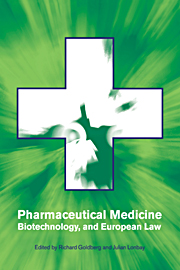Book contents
- Frontmatter
- Contents
- Notes on the contributors
- Preface
- Foreword by Francis G. Jacobs
- Editors' note
- Table of cases
- Table of treaties, European legislative instruments and national legislation
- Introduction
- Part I Free movement of goods and persons, competition and intellectual property
- Part II European drug regulation
- Part III Biotechnology
- Part IV Product liability and transnational health care litigation
- Index
Introduction
Published online by Cambridge University Press: 24 October 2009
- Frontmatter
- Contents
- Notes on the contributors
- Preface
- Foreword by Francis G. Jacobs
- Editors' note
- Table of cases
- Table of treaties, European legislative instruments and national legislation
- Introduction
- Part I Free movement of goods and persons, competition and intellectual property
- Part II European drug regulation
- Part III Biotechnology
- Part IV Product liability and transnational health care litigation
- Index
Summary
This collection of essays seeks to examine several developing areas of the law relating to pharmaceutical medicine and biotechnology in the European Community. The essays address four such topics which have emerged in recent years, namely: (1) free movement of goods and persons, competition and intellectual property; (2) European drug regulation; (3) biotechnology; and (4) product liability, which is addressed along with transnational health care litigation.
The Treaty of Rome established rules on free movement of goods (Articles 28 to 30 (ex 30 to 36) EC) and competition (Articles 81 and 82 (ex 85 and 86) EC), which have had a profound effect on the use of intellectual property rights to prevent the importation of patented and trade-marked pharmaceuticals from one European State to another. Professor William Cornish's essay explains the doctrine of exhaustion of patent rights in the internal European Community (EC) and European Economic Area (EEA) market. Here, patent rights are exhausted to the extent that they cannot be used to prevent the importing of patented pharmaceuticals from one EEA State to another, when first marketing of the goods is by or with the consent of the owner of the patent for them in any of the EC/EEA countries. Although acknowledging the doctrine of exhaustion for parallel importation from one EEA State to another, Cornish convincingly argues against a rule of international exhaustion of patent rights for parallel importation of products into the EEA from countries outside it, since patent systems are incentive systems and thus patentees should be able to engage in international price discrimination. Nevertheless, he appears to take issue with Belinda Isaac's criticism of the international exhaustion principle in respect of trade mark rights.
- Type
- Chapter
- Information
- Publisher: Cambridge University PressPrint publication year: 2001
- 1
- Cited by



